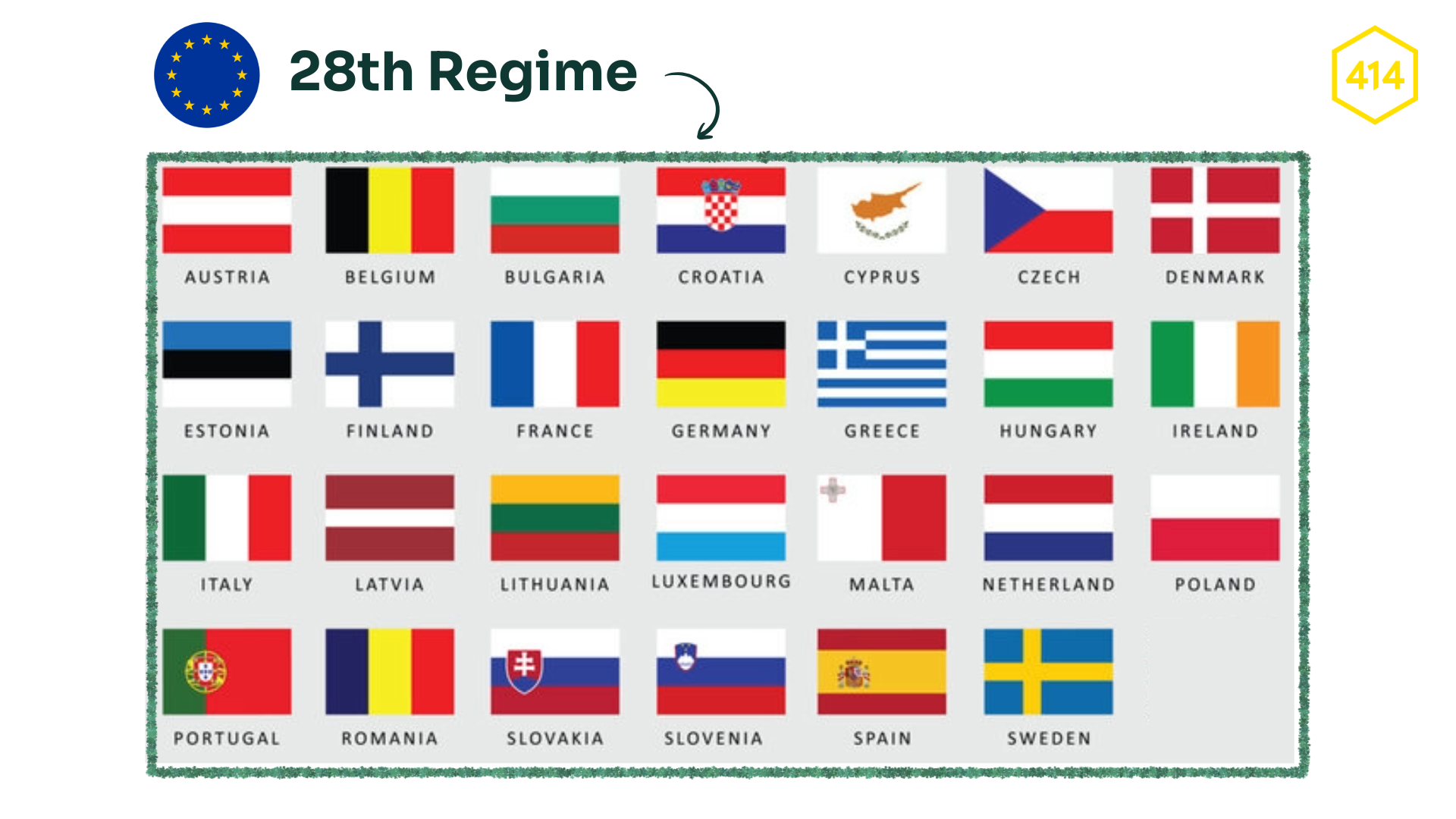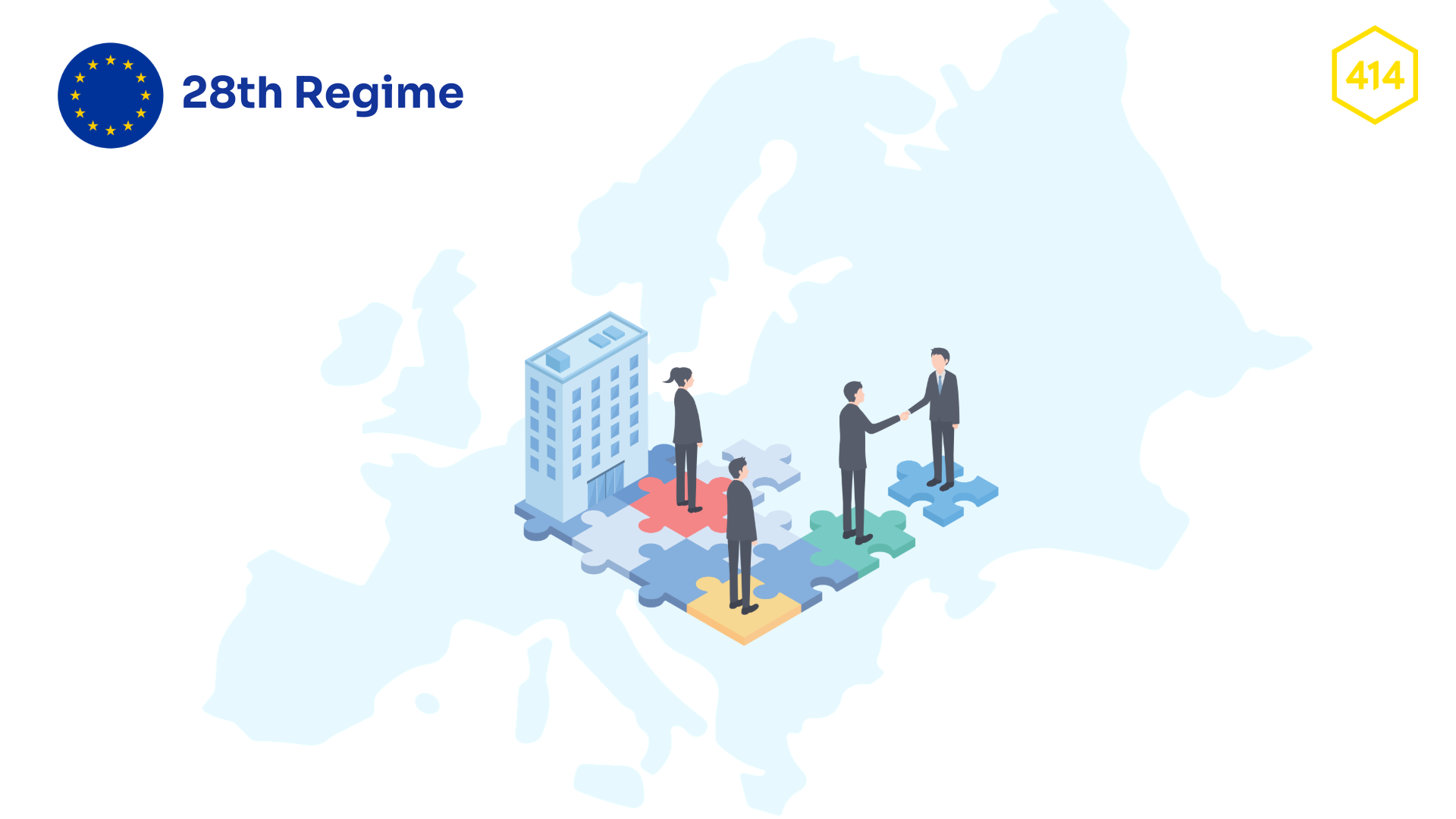Scaling a Startup in the EU? Here’s What You Need to Know About the 28th Regime
What Is the 28th Regime?
The 28th Regime is a proposed EU-wide corporate legal framework designed to complement national company laws without replacing them.
The name “28th Regime” refers to the fact that it is an optional 28th legal framework alongside the 27 national regimes of EU Member States.

It is not mandatory: companies may still choose to incorporate under national rules. However, the 28th Regime offers a streamlined and harmonised alternative for founders, especially those active across borders.
In particular, it offers a compelling value proposition for startups, scaleups, and the investors who back them. It addresses long-standing pain points that many early-stage and growth companies encounter when navigating fragmented EU markets.
Why Is the 28th Regime Needed?
If you are a founder of a startup company operating within the EU, you surely have experienced firsthand the operational complexity and administrative burden involved in scaling a business across Member States.
What should be a natural growth path within a unified “single” market often turns into a fragmented, costly maze with different rules for employment, taxation, incorporation, and compliance in every country.
According to the Dragui and Letta Reports, in today’s global market, this fragmentation undermines Europe’s competitiveness. The hard truth is that companies operating in the U.S. or China can grow more quickly thanks to harmonised rules, integrated markets and unified access to capital. Despite having a combined population of around 450 million people and a GDP of nearly €20 trillion, the EU still functions in many ways as a mosaic of 27 smaller markets.
In this context, most EU entrepreneurs have weighed the option of moving to the U.S., where a startup can access a large, integrated consumer market, raise capital more easily, and scale under a single regulatory framework.
In the EU, by contrast, entrepreneurs are asked not only to localise their marketing and operations, which is just natural when launching any business, but also to navigate 27 different legal systems that were never designed to support high-growth companies expanding across borders.
These are the key challenges the 28th Regime seeks to solve:
- Administrative burdens from having to incorporate subsidiaries under different national laws
- Legal uncertainty and inconsistent requirements for founders, especially solo entrepreneurs
- Barriers to cross-border investment and scaling, particularly for digital or services-based businesses
By providing a uniform set of rules, the 28th Regime aims to make it easier, faster, and cheaper to set up and run a company across the EU.
If adopted, the 28th Regime would create a fully digital, pan-European legal form for companies. Founders can setup a company remotely, without a notary or physical presence in any Member State.
It is designed specifically for companies with one shareholder. A large share of EU startups are founded by solo entrepreneurs or are initially structured as single-shareholder entities.
All companies would follow the same rules regardless of where they are registered. Businesses would operate freely across the EU without needing to reincorporate locally.

Like national limited liability companies, under this regime, shareholders are only liable up to their contribution. This would simplify legal structuring for founders, remove duplicative compliance obligations, and increase clarity for investors.
What does the 28th Regime mean in practice?
Easier market entry
Startups often face significant administrative hurdles when trying to expand into other EU countries. Incorporating subsidiaries in multiple jurisdictions typically involves complex, costly, and time-consuming processes, often with legal inconsistencies across Member States.
The 28th Regime eliminates these barriers by allowing a company to be set up once, digitally, and operate across the EU under a unified set of rules. For startups, this means:
- Faster go-to-market timelines in new countries
- Reduced reliance on local legal counsels
- Simpler group structuring, especially for platform or service businesses operating remotely or online
For investors, this can increase capital efficiency, reduce setup delays post-investment, and streamline portfolio company expansion strategies.
Lower costs and faster setup
Legal formation costs can be disproportionately high for startups, especially when launching in multiple countries. The 28th Regime is designed to be cost-effective by default, removing expensive formalities like notarisation or in-person filings.
From an investor’s perspective, leaner startup costs improve capital deployment efficiency and extend runway, which is particularly valuable for seed and early-stage portfolios.
Greater legal certainty
One of the hidden costs of fragmented EU company law is legal ambiguity: founders and investors must assess and manage risks under unfamiliar national regimes, each with its own quirks in shareholder rights, governance rules, or dispute resolution frameworks.
The 28th Regime offers predictable governance structures that are uniform across the EU and standardised shareholder rights and protections.
Therefore, investors operating cross-border or co-investing with international partners will have a more reliable foundation for investment, smoother exits, and fewer surprises post-transaction.
Easier Pathways for Cross-Border M&A or Exits
As many startups scale, they prepare for acquisition or cross-border mergers, which are often complicated by inconsistent corporate forms and registration obligations in different EU countries.
Under the 28th Regime:
- Acquiring or merging with another company is simpler due to standardised legal rules
- Due diligence and corporate restructuring are more efficient
- Exit strategies face fewer legal roadblocks
For investors, this improves the liquidity outlook and value realisation potential for successful investments.
Why 28th Regime? Why not replace all 27?
Critics who argue that the 28th Regime should go even further by replacing national systems overlook a fundamental truth: the EU is not a unitary state. It is a supranational organisation, built on cooperation and subsidiarity. National governments remain sovereign, particularly in areas like taxation, corporate law and justice.
While a fully unified regime sounds appealing in theory, it is politically and legally unworkable today. Insisting on an all-or-nothing approach would result in nothing at all.
The genius of the 28th Regime is precisely that it works within the EU’s institutional constraints to deliver a functional solution. It creates a single legal option, not an imposition, allowing innovative companies to opt into a more coherent and scalable structure.
In doing so, it can help retain innovation within Europe, reduce founder fatigue, support internationalisation and offer a stronger foundation for investment and job creation.
Let’s not mistake compromise for weakness. This proposal is not perfect, but it is actionable, impactful, and urgently needed. If implemented correctly, it can lay the foundation for a truly innovation-friendly Single Market.
How does the 28th Regime link to Sustainability?
Although the 28th Regime is primarily framed as a tool for administrative and economic streamlining, its indirect benefits for sustainability should not be underestimated. A more harmonised and accessible legal structure helps lower the barriers to market entry and scale for mission-driven, sustainability-focused businesses.
For example, companies developing circular economy models, low-carbon technologies, or sustainable agriculture solutions often face structural disadvantages. These ventures typically require long lead times, cross-border partnerships, and transparent value chains, all of which are harder to manage under the current patchwork of national company laws.
By removing the need to duplicate legal entities, tax registrations, and corporate filings in every new Member State, the 28th Regime can free up resources that sustainable startups would rather invest in R&D, operations, or stakeholder engagement.
Legal simplicity, in this context, becomes an enabler of climate and social innovation, rather than an administrative concern alone. In that sense, while the 28th Regime is not a sustainability policy on the surface, it could be one of the most strategically relevant enablers of a greener, fairer, and more competitiveEuropean economy underneath.

.png)

.png)

